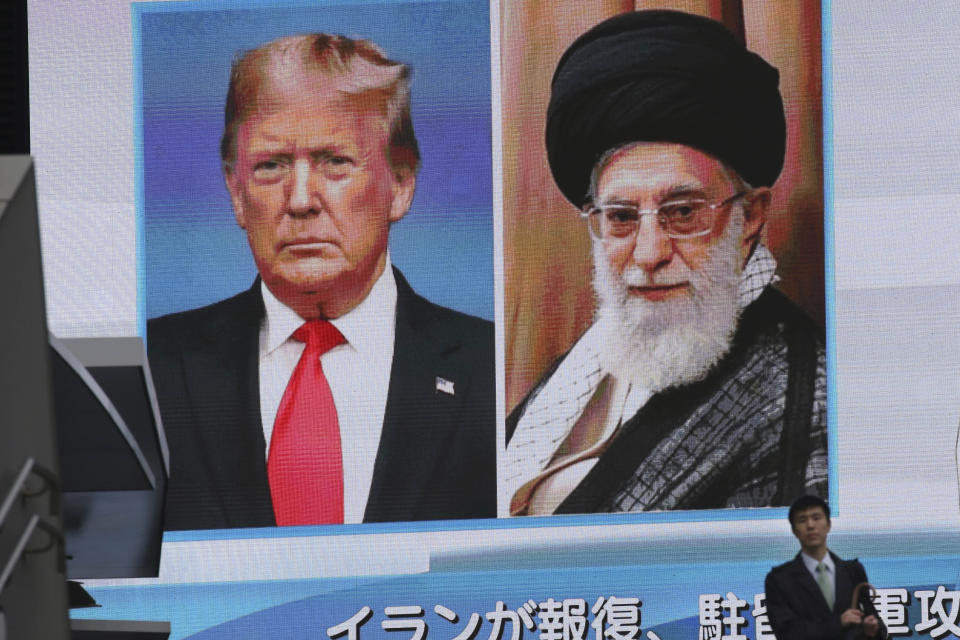Geopolitically charged sell-offs tend to be short-lived: Morning Brief
Thursday, January 9, 2020
Get the Morning Brief sent directly to your inbox every Monday to Friday by 6:30 a.m. ET. Subscribe
As seen on Wednesday
On Monday, we noted that sell-offs related to geopolitical tensions tend to be short lived.
Overnight on Tuesday, futures fell sharply after Iran fired missiles at U.S.-Iraqi bases.
On Wednesday, stocks hit record highs.
Markets rallied after President Donald Trump said Tehran “appears to be standing down,” and suggested an armed response from the U.S. to Tuesday’s actions in Iraq isn’t imminent.
Trump also announced additional economic sanctions against Iran on Wednesday.
The market’s reaction to Trump’s comments — taken at face value — indicates that investors aren’t worried about Middle East tensions. Which isn’t quite right. There are always uncertainties facing investors and U.S.-Iran relations are now a big part of that calculus when just a few weeks ago this risk was pretty well off the radar for most investors.
But the market’s rally on Wednesday does show how political and geopolitical considerations fit in to any market moment. Which is to say that politics can often cause short-term volatility or exacerbate existing trends but will not create new, overarching market narratives on their own.

Impeachment, for example, is a political event we’ve covered several times in the last few months. And the “what it means for investors” answer was and remains: the stock market’s trend will prevail.
In the 1970s, Watergate occurred during a down market because the economy and stock market was enduring one of its low points in post-World War II history.
In the late 1990s, the Clinton impeachment coincided with a rally in stocks because the market was bouncing back from the Russian financial crisis and preparing for the last blow-off rally ahead of the tech bubble bursting two years later.
In 2019, the stock market rallied during Trump’s impeachment because the Fed was cutting rates and the global economy appeared poised for a rebound in the year ahead. And this, of course, is the market moment in which we remain.
Investors are betting on better earnings, better growth, and easy monetary policy in the year ahead. They’ve been placing bets in this direction for months.
Middle East dustups will always drive news headlines and can oftentimes hurt markets in the short-run. The “pain” felt in the S&P 500 as a result of the 2020 U.S.-Iran conflict has so far been less than 1%. It’s almost like it didn’t happen at all.
By Myles Udland, reporter and co-anchor of The Final Round. Follow him @MylesUdland
What to watch today
Economy
8:30 a.m. ET: Initial Jobless Claims, week ended Jan. 4 (220,000 expected, 222,000 prior); Continuing Claims, week ended Dec. 28 (1.719 million expected, 1.728 million prior)
9:45 a.m. ET: Bloomberg Consumer Comfort, week ended Jan. 5 (63.9 prior)
Earnings
Post-market
4:10 p.m. ET: KB Home (KBH) is expected to report adjusted earnings of $1.30 per share on $1.60 billion in revenue.
Top News

China's Vice Premier Liu to sign U.S. trade deal in Washington next week [Reuters]
Downbeat Mark Carney speech sends pound falling [Yahoo Finance UK]
Phone hits double-digit growth in China, official data show [Bloomberg]
YAHOO FINANCE HIGHLIGHTS
US wine shops see existential threat in proposed 100% tariff
Impossible Foods CEO slams 'the most destructive technology on Earth by far'
Carlos Ghosn: 'I did not escape justice. I fled injustice.'
Follow Yahoo Finance on Twitter, Facebook, Instagram, Flipboard, SmartNews, LinkedIn, YouTube, and reddit.

 Yahoo Finance
Yahoo Finance 

